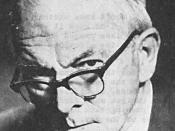Onto his village, Kumalo imparts the sense of spirituality and his occupation is that of minister; his journey into Johannesburg alters his perceptions of reality and it is through him that Paton shows the strength that faith can provide strength to those who are worthy and deserving of it and to be used for the greater good. When his brother, John, allows the power of voice that he wields over the others, Stephen goes to warn him that, "power corrupts, that a man who fights for justice must himself be cleansed and purified, that love is greater than force" (246). Kumalo warns that those who attempt to do good deeds but have even the slightest taint of evil within themselves will allow themselves to turn towards weaker forces. It seems possible that Paton believes that those who attempted to help before were unable to do so because they allowed themselves to attempt to use force in order to coerce change into occurring without actually changing the reasons for which the separation was encouraged and enforced.
When a small boy comes to Kumalo for tutoring, he enjoys his presence for a long time but when the boy must finally leave, Kumalo admits to the demonstrator, "If God wills ... before I die. For I have lived my life in destruction" (289). The demonstrator believes that the land will return to normal, but Kumalo admits that he does not believe he will live to see it because of the way that he has lived his life. He, who was the one to preach incorruptibility, fell to lesser means and consequently must live with what he has done. When Msimangu preaches to the blind, Kumalo believes that a message was hidden within it that was meant for him and he thinks, "Yes, he...


